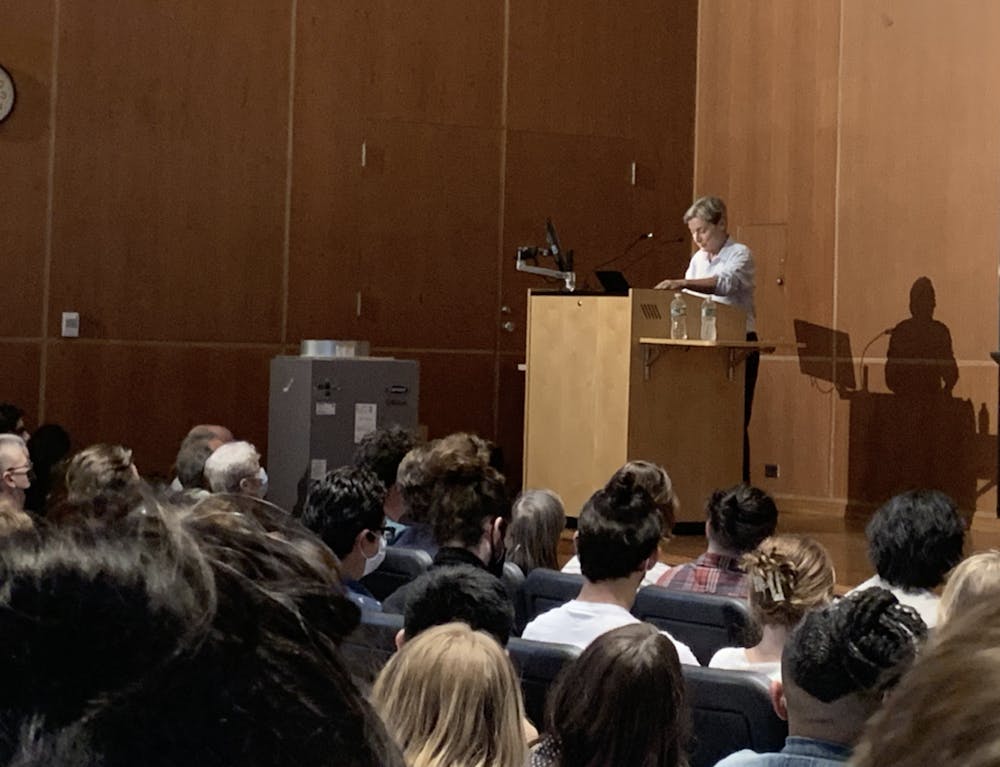On Monday Nov. 7, Professor Judith Butler from University of California, Berkeley gave a lecture entitled “Fury and Justice in the Humanities,” which centered around Aeschylus’s play “Eumenides,” the relationship between violence and the law, and prison abolition.
The lecture was sponsored by The Eberhard L. Faber 1915 Memorial Fund in the Humanities Council and the Department of English.
Professor of English Eduardo Cadava introduced Butler, saying, “Introducing Judith is simultaneously an easy task, because you already know them and their work,” Cadava said, “and an impossible one, since it’s not possible to convey everything they have given us and continue to give us.”
Butler began their lecture by speaking about the humanities and legal violence.
“My sense is that the humanities gives us something different — namely, a way to reconsider the relationship between law and violence,” Butler said. “Specifically, the emergence of legal violence as the alternative to extra legal vengeance.”
They said this topic is particularly relevant because “it matters that some social justice movements are skeptical about whether justice can be achieved through law,” as opposed to the alternative of “seeking recourse” through the Twittersphere.
Butler recounted their original understanding of “Eumenides.”
“I came not to trust the account that I was given in high school,” they stated. “The rudimentary trial protocols that Athena establishes … tend to be read as a transition from darkness to light — from cycles of revenge to a form of justice that puts an end to such cycles.”

Butler challenged the simplicity of this initial reading — and throughout the event, continued to unravel the text through a close textual analysis.
“The point is not only that the Furies acquiesce to the law as such, but rather to the trial as a legal procedure modeled awkwardly by the one that Athena herself has just established,” they said.
Butler related alternative interpretations of the play to a larger societal narrative on the legal system.
“One could also just become angry at the very legal institutions that promised to overcome violence and injustice while actually embodying violence, often embodying a greater violence than the one they claim to overcome, intensifying injustice,” Butler said. “What we can call a legitimate fury is one that can be neither contained nor seduced by law.”

Butler pointed to the prison system is an example of such violence.
“Prisons often send those individuals into even more violent cultures, saturated with legitimized police violence,” they said. “The prison system is a complex of legal violence or violence that is supported by a complex set of legalities.”
Returning to Aeschylus, Butler connected the violence in prisons to the Furies.
“Could it be that the deal is one that cannot be refused precisely because [the Furies] did not have to give up their violence?” asked Butler. “Athena reminds us that the law is based on fear and the Furies may well take on the job of making sure that the law remains feared.”
Butler described their analysis of the end of the play: “Rage is subsumed but not negated. Can we read the rageful torture of the Furies reinstated now within the very terms of law?”
“One cannot oppose violence without opposing the law. And yet the law is set to deliver us from violence,” Butler said.
“I’m not sure that this is wisdom, but it may be the capacity to see the difference between expecting justice from the law and demanding the dissolution of legal violence that stops some measure of life’s unbearability.”
The lecture, titled “Fury and Justice in the Humanities,” was held in McCosh Hall, Room 10 and ran from 4:30 to 6 p.m.
Jackie Zhou is a News contributor for the ‘Prince.’ Please direct any corrections requests to corrections@dailyprincetonian.com.








